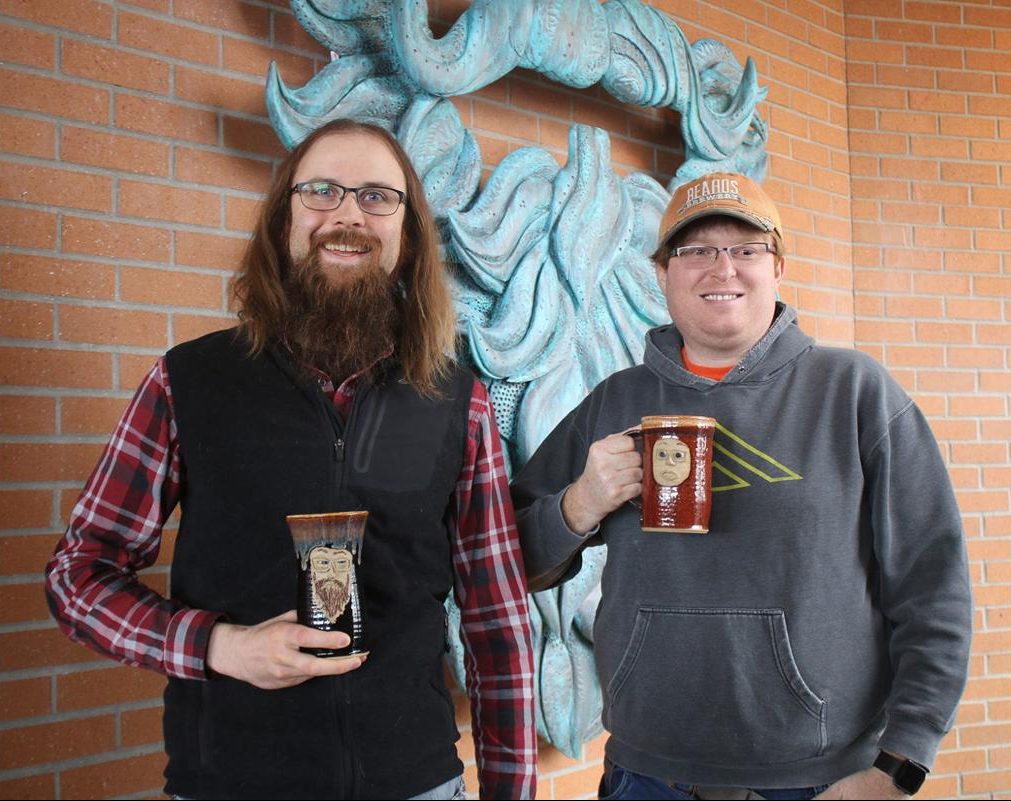Petoskey natives Ben Slocum and Peter Manthei launched a brewery business in 2012 while wrapping up their college degrees. Bewhiskered at the time, the co-founders aptly named their business Beards Brewery. In 2017 they opened a restaurant in Petoskey, along with a production facility in nearby Charlevoix, which fueled growth and helped them move into second stage. To hone their marketing efforts and management muscle, the entrepreneurs entered the System for Integrated Growth®(SIG) in 2019, followed by a repeat engagement in 2020.
“Both Peter and I have English degrees, so we’ve been learning business as we go,” Slocum explains. “Having a program like SIG that enables us to fill gaps in our knowledge base has been tremendous.”
During their first engagement, a SIG specialist who specialized in geographic information systems helped the partners identify the ideal customers for the distribution side of Beards Brewery — not only who those customers were, but also where they could be found. These demographic deliverables enabled Slocum and Manthei to focus on specific taprooms and restaurants rather than taking a shotgun approach to marketing. Case in point, the young brewers were able to break into Bridge Street Market, a neighborhood specialty store in Grand Rapids owned by Meijer. “Once our product became proven there, Meijer automatically added us to other stores, and now we’re in 24 locations,” Slocum says.
As a result, retail sales for Beards Brewery soared during the fall and winter of 2019. “Normally our busiest months are June, July and August,” Slocum says. “Yet from October through January each individual month beat the peak summer months with massive increases.” And though numbers dropped with the onset of the pandemic, Slocum is confident his company will regain its momentum.
In addition to assistance with marketing, another SIG specialist helped Beards Brewery with financial controls, validating their approach to bookkeeping and providing guidance on budgeting and costs.
The company’s second SIG engagement, which took place during the pandemic, focused on B2B networking and HR best practices. Due to Michigan laws, breweries have to go through both a wholesaler and retailer to reach their end customer, which can be challenging compared to other small businesses, Slocum points out.
On the HR side, Slocum wanted to learn best practices and put together the most comprehensive package possible to attract and retain talent. “With the extra unemployment insurance bonuses, there’s been less incentive for folks to go get jobs,” he says. “In addition, the attitudes of restaurant customers can be challenging. We’ve had 40- and 50-year-old adults screaming at our staff, many of whom are teenagers, and threaten to sue us because they don’t want to wear a mask.”
Slocum gives the SIG program a hearty thumbs-up. “Both engagements were extremely helpful, and even with the pandemic, we’re sitting in a much better financial position,” Slocum says.
In addition to SIG, Slocum has participated in other Edward Lowe Foundation programs:
Retreats at Big Rock Valley — educational programs held at Big Rock Valley, the foundation’s learning campus in southwest Michigan. Slocum and Manthei attended a “Leadership of Me” retreat in 2018 along with other Michigan 50 Companies to Watch awardees. “It was my first time talking candidly with other second-stage business owners, and it was absolutely eye-opening,” Slocum says. “It can be lonely as a business owner, and although I’ve attended peer groups in my hometown, it’s tough to talk because people can be guarded. It was easier to discuss challenges with the retreat participants because we had no preconceived ideas of each other.”
COVID-19 roundtables — a virtual program that focuses narrowly on problems and opportunities presented by the pandemic “There was a wide mix of people, and it was amazing to hear that we were dealing with similar issues although we’re in different industries with dramatically different types of employees,” Slocum says. “Two people who were in very professional environments brought up the fact that they were also losing people due to higher unemployment insurance benefits. It’s good to know you’re not alone.”
American Academy of Entrepreneurs (AAE) — a six-month mentoring program that pairs highly successful entrepreneurs with less experienced ones. Slocum’s AAE cohort began in August 2020 with a virtual retreat, which was attended by several pairs of mentors and mentees. Slocum expects to derive tremendous value from AAE. “It was quite helpful to begin the program as a group,” he says. “Also, it was my first time to be in a Zoom meeting that used the breakout rooms for smaller group discussions, which was a unique approach.”
Each of the foundation’s programs has been more valuable than the last, Slocum observes, “which is less about content and more about how the programs build off each other.”
“It’s easy to start a small business, but once you hit second stage, you encounter unique challenges,” he adds. “In addition to striving for more growth, Peter and I are trying to implement infrastructure and processes to make our business self-sufficient. It’s amazing to have resources to help us along the way.”
